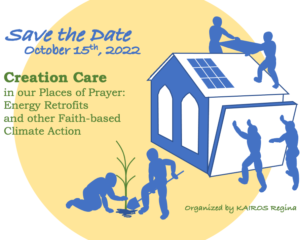Our Call to Care for Creation

KAIROS Regina invites you on a journey of faith, one that challenges our comfortable lives and changes the very buildings we worship in. On October 15, KAIROS Regina will host a one-day hybrid conference called, “Creation Care in our Places of Prayer: Energy Retrofits and other Faith-based Climate Action.” In the leadup to that session, they will offer us six articles to prepare our hearts and minds for the deep transformation that is needed. This first article is by Matt Dipple (engineer and building consultant), Russell Mitchell-Walker (diaconal minister) and Laura Stewart (climate activist), who serve on the Climate Justice Working Group for KAIROS Regina.
Throughout history, the Spirit of God has called prophets and sent them to prosperous, comfortable people, telling them to repent, to give up their security and certainty and pursue a more just, peaceful, and loving world.
Often, this was not a welcome message; the prophets were rejected, even stoned.
Sometimes, as in the city of Nineveh, when the people faced the consequences, they remembered the warnings and tore their clothes, seeking new ways of right living. The worst of disaster was prevented.
Today, it is harder and harder to ignore the many prophets speaking truth to our consumption of resources, and emissions of greenhouse gasses. The atmosphere has already been changed; emissions must go to zero fast (more about this next week); consequences will continue to worsen regardless, but the longer we continue emissions, the worse outcomes we will face.
This prophetic message is hard for us to hear.
In Genesis, God calls Creation “good.” In Jesus, we see a God who is present to us in our physicality, and who mysteriously becomes a part of Creation—every day we breathe oxygen molecules that Jesus once breathed. Alongside the prophetic calls to ecological repentance, we have examples of many teachers: holy women and men who live lives that honour and care for God’s Creation. Why is it still so hard for us to act?
Perhaps the hardest part of hearing the message is the ordinariness of our days: we don’t feel threatened as much by climate change as by the lifestyle changes asked of us by climate action. We can still get up and go about our days and not feel collective anxiety; ordinary things are still happening; people are still “marrying and giving in marriage.” It just can’t be that bad. We’d rather trust the familiar ways we have been doing things, than consider following a new and uncertain path. Throughout the Gospels, Jesus tells his disciples not to be afraid. We need that encouragement now more than ever!
Our culture needs prophets to shake us out of our ease with the basic, day-to-day norms of our lives. Our culture needs teachers to show us what to do with uneasy feelings once we stop shoving them down, and to guide us as we learn to talk with one another about the massive change that is upon us. Our culture needs healers to bring salvation—a salve upon the psychic wound that tears open at the moment when we finally see the wounds we have inflicted on the earth that sustains us, crucifying our Mother Earth as once we crucified our Brother Jesus. We need midwives to help bring forth the new life of the resurrection—a hope that God can use even climate change to expand our hearts.
This work of awakening, guiding and healing people through a huge transition: that is work for faith communities. It is a natural continuation and resurrection of a long history of church work in education and health care.
On October 15th, KAIROS Regina invites you to join us in the work. We have chosen to begin where our faith traditions clearly intersect with the challenge of decarbonizing: in tackling emissions from the buildings where we gather to worship and serve God. This will be our primary focus, but we welcome you to also think more broadly about other climate impacts from our practices of faith, ways we can build climate resilience in our sacred places and our communities, and how our efforts can help others turn and move with us toward a right relationship with our climate. We invite you to tell us what topics need our attention in future events, and build a network to support one another’s work. Let’s bring all this together and set out on a journey of faith, not knowing exactly where it will lead, but trusting that God will go with us.
